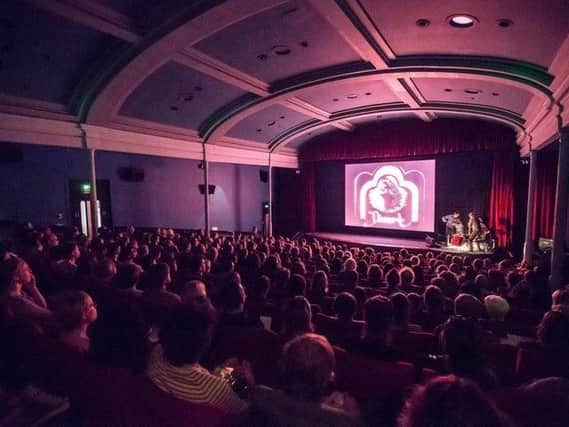Edinburgh International Film Festival and Filmhouse must be saved – Aidan Smith


Where was it showing? Filmhouse. Of course, couldn’t be anywhere else. But 24 hours after I’d made a note of the first screening, due to have been tomorrow night, Edinburgh’s arthouse cinema went bust. And that’s not all. The city has lost its Filmfest, too.
The charity which managed both, blaming the issues with which we’re all too familiar, topped off with crippling energy bills, had also run Filmhouse’s sister cinema in Aberdeen, the Belmont. Talk about triangle of sadness.
Advertisement
Hide AdAdvertisement
Hide AdFor the capital in particular this is a tragedy. The Edinburgh International Film Festival had always been part of the cultural spectacular but very much its own thing.
A few years ago, with August being swamped by the Fringe and strangled by stand-up comedians from TV panel shows, it boldly decided to leave the Big Tent and set up on its own in early summer. Then, reinvigorated, and with the city able to welcome back the crowds after Covid, it had only just returned to its traditional spot to take on the gagmen again.
There was a time, though, when it was the best show in town. Just ask Martin Scorsese about the Filmfest of the 1970s. Woody Allen too. Edinburgh championed these movie-makers when they were cult names, still in their 30s, respectively viscerally exciting and neurotically funny, and a long way from when they would begin to repeat themselves.
Back then, movies weren’t released everywhere on the same day. London saw Jaws first and only after the beach at Portobello had been cranked up to Amity’s degree of frenzy would the projectors roll here.
So imagine how special it felt to be a spotty cineaste at the EIFF premieres of Mean Streets, Taxi Driver, Annie Hall and Manhattan, and be able to quote the best lines (“You talkin’ to me?” … “A mook? What’s a mook?” … “Don’t knock masturbation. It’s sex with someone I love”) before the Big Smoke got wind of them.
I lived for the Filmfest during the 70s and don’t mind admitting I had a crush on Lynda Myles, the director with the movie-star looks who dreamed up the programmes. Myles and some like-minded souls had previously written to The Scotsman criticising the EIFF for its “tepid mediocrity” and for their cheek were challenged to come up with something better.
This they did but not in a way which provided Monty Python with any more material for their send-ups of film festivals – earnest and goatee-strokingly pretentious in attempting to locate the sub-text beneath the sub-text of four-and-a-half hour Scandinavian domestic dramas set entirely round the dinner-table.
Edinburgh was unafraid of being commercial, pulpy and even schlocky. It dug up B-movies which were often better than the main features, with Gun Crazy’s kiss-kiss, bang-bang being especially memorable. Scorsese’s fellow “movie brats” were feted, along with pioneering female auteurs and trail-blazing documentarists. The festival was questing, sexy and fun.
Advertisement
Hide AdAdvertisement
Hide AdIt always amused me that Filmhouse, which became the Filmfest’s headquarters, was situated slap-bang in the middle of the capital’s most chaotic thoroughfare, one where the excitement found in the fleshpots often spilled onto the pavement. But such scenes were nothing compared to what we’d find in an Edinburgh-first midnight showing of the latest David Cronenberg shocker.
Before there was the bigger auditorium accessed by the grand entrance on Lothian Road, Filmhouse comprised just one small screen, located up a dank cobbled close round the back. This was where the Edinburgh Film Guild met, and I’d drag my wee sister along for yet more intriguing cinematic oddities, unpolished gems, films noir to chill the blood and imperishable classics to gladden the heart.
I’d graduated from an ABC Minors badge – the Saturday morning kids’ club insignia which shone luminously when a hand was cupped round it and gained entry to cliff-hanging Batmanserials – to a little mustard-coloured booklet denoting the Sunday evening features by title, and that was all.
We were young, there was no internet, so the films were taken on trust – but I always thought that Miss Jean Brodie would have approved of the Guild, the oldest, continuously-running film society in the world.
True, there was more chance of a four-and-a-half hour Scandi epic but by then we’d sat through Napoleon at the EIFF, a 1927 silent movie dusted down by new director Jim Hickey, presented with a full orchestra. That one lasted a full five hours. You see, we were hard.
I can’t quite believe I’m writing about the EIFF, the Filmhouse and the Guild in the past tense, but for me that’s already what they’d become. Sad to say I’d got out of the movie-going habit. Blame parenthood, blame the pandemic, blame the cost-of-living crisis, blame Netflix and Film4 and the brilliant Talking Pictures TV, home to films with a very Edinburgh stamp, without ever having to leave the house.
But I was coming back. Triangle of Sadness was going to return me to my favourite pleasure palace.
There’s a campaign to save the Filmfest and I wish it well. Another cherished Filmhouse memory was a retrospective for that Scots titan of TV drama, Peter McDougall, with his gritty Plays for Today being accorded the cinematic treatment. A line from Just a Boys’ Game is ringing in my head and I just hope it’s not going to be prophetic: “Yer too late – Custer’s deid.”
Comments
Want to join the conversation? Please or to comment on this article.
